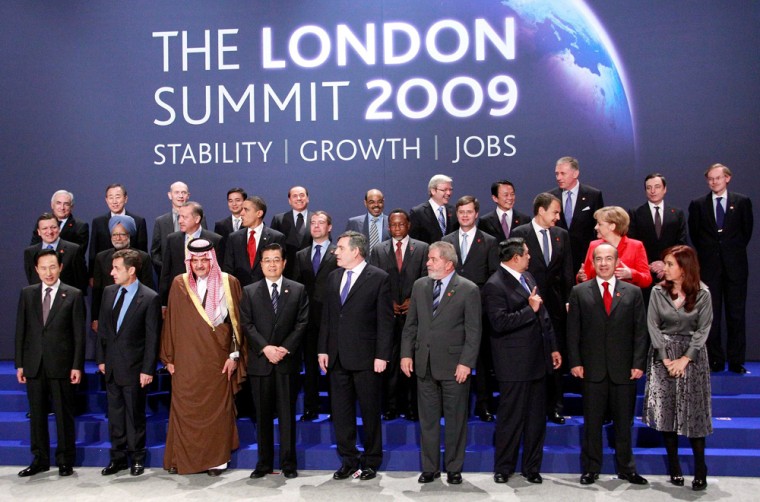Will it all work?
World leaders achieved the minimum at their London summit, cobbling together more resources for the International Monetary Fund and pledging to better regulate unruly financial markets. But no country would budge from its bottom line, so the biggest goals were not met.
Global markets cheered anyway, happy that the Group of 20 leaders were able to demonstrate unity in the midst of the worst financial crisis in decades.
In the end, the ability of President Barack Obama and the other leaders to paper over their differences may turn out to be the biggest achievement of all.
Despite some tough talk going into the meetings, including a threatened walkout by French President Nicolas Sarkozy if things didn't go his way, the leaders emerged with a show of common purpose.
Their final communique even contained a pleasant surprise in the form of a tidy $1.1 trillion pledge to help make sure emerging economies in Eastern Europe, Latin America and elsewhere can tap into sufficient resources at the International Monetary Fund to withstand the current turbulence.
That pile of money was easier to obtain because it won't force the United States or other countries to increase their deficits to supply the additional resources to the IMF. Instead, much of the increased support will come in the form of loans the major countries will agree to provide to the IMF if the agency needs more firepower.
The leaders also pledged to fill in the current gaps in financial regulation that have been laid bare by the troubles that began in subprime mortgage lending in the United States but have now spread to other types of loans not only in the U.S. but around the world.
No global regulator
Obama stood firm against a determined push from Sarkozy and German President Angela Merkel for creation of a global regulator to attack what the Europeans see as a U.S. brand of unfettered capitalism that brought the global economy to its knees.
In the end the U.S. argument prevailed. Instead of the more powerful global regulator, the summit called for better coordination among individual country regulators and increased transparency to provide more oversight of the so-called shadow banking system of hedge funds and other lightly regulated financial entities.
The approach adopted by the G-20 closely follows the outlines of a regulatory overhaul that U.S. Treasury Secretary Timothy Geithner unveiled last week.
Many economists believe this approach offers the best chance of repairing the flaws in the current system quickly, avoiding a long, drawn-out fight over creation of an all-powerful global overseer.
"I think the fact that the G-20 did not go for a global regulator was the right decision," said Morris Goldstein, a former top official at the IMF and now an analyst with the Peterson Institute for International Economics in Washington. "The key agreement they did achieve was to declare that any systemically important institution, such as hedge funds, will be regulated."
The G-20 empowered a renamed and expanded Financial Stability Board — which will now include all the member countries in the G-20 — to provide guidance and expertise in the regulatory overhaul effort. This group, formerly called the Financial Stability Forum, was created after the 1997-98 Asian currency crisis to provide a way for countries to discuss financial regulatory issues.
The G-20 also pledged an immediate effort to crack down on offshore tax havens, a loophole in the current global regulatory system that costs the United States and other nations billions of dollars in lost tax revenue each year. These offshore finance centers are also the home for many hedge fund operations.
But that effort's success could depend heavily on whether the major economies can bring enough pressure on countries such as Monaco and the Grand Cayman Islands.
Working together
Obama and his colleagues made all the right pledges to fight political pressure at home to raise protectionist barriers to protect domestic industries. The G-20 made the same pledge at their first leaders' summit last November in Washington. But since that time, 17 of the nations at that meeting, including the United States, have moved to protect domestic industries in the current downturn.
Even with that failure of will, analysts said, the problems would be much worse if there wasn't a G-20 process at work to keep nations from pursuing the disastrous policies that turned the stock market crash of 1929 into the Great Depression of the 1930s.
"The main benefit of the G-20 is that it demonstrates that world leaders are working together and have a high level of commitment to quelling the crisis," said Mark Zandi, chief economist at Moody's Economy.com.
"They have taken a lesson from the Great Depression when countries didn't work together and that caused the whole system to crumble," Zandi said. "No one wants to see that happen again."
